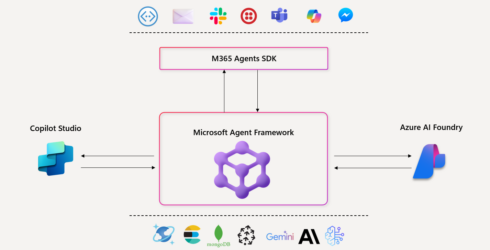

Microsoft has announced a preview of the Microsoft Agent Framework, an open-source development kit for .NET and Python for creating AI agents and multi-agent workflows.
It supports creating individual agents as well as graph-based workflows to connect up multiple agents.
According to Microsoft, the Agent Framework is a direct successor to its other projects Semantic Kernel and AutoGen, utilizing foundations from both. It brings together Semantic Kernel’s enterprise-grade features like thread-based state management, type safety, filters, telemetry, and model and embedding support, with AutoGen’s abstractions for single- and multi-agent patterns.
“Both had passionate users — but each had gaps,” Microsoft wrote in a blog post. “Developers asked us: why can’t we have both — the innovation of AutoGen and the trust and stability of Semantic Kernel — in one unified framework?”
Like Semantic Kernel and AutoGen, the Agent Framework will also be open-source and Microsoft welcomes the community to contribute.
The Agent Framework was built around open standards, and supports MCP, Agent-to-Agent (A2A), and OpenAPI. MCP allows agents to discover and use external tools or data sources, A2A allows developers to build agents that can collaborate with other agents, and OpenAPI support allows any REST API that follows the OpenAPI specifications to be imported as a callable tool. Agents can run in containers, on-premises, or across multiple clouds.
It supports several different orchestration patterns, including sequential orchestration for step-by-step workflows, concurrent orchestration, group chat orchestration for agents to collaborate, handoff orchestration to move responsibilities between agents, and magnetic orchestration, which allows manager agents to build a task ledger that coordinates specialized agents and humans to solve complex problems.
Other features that the Agent Framework has includes built-in connectors to enterprise systems, pluggable memory modules, YAML and JSON definitions for declarative prompting, support for OpenTelemetry, and the ability for agents to pause, resume, and recover from interruptions.
“Agents are fast becoming the next layer of application logic — reasoning about goals, calling tools, collaborating with each other, and adapting dynamically. With Microsoft Agent Framework, developers now have a single, open-source foundation that carries the best of research innovation into production with the durability, observability, and enterprise readiness required to scale,” Microsoft wrote.




